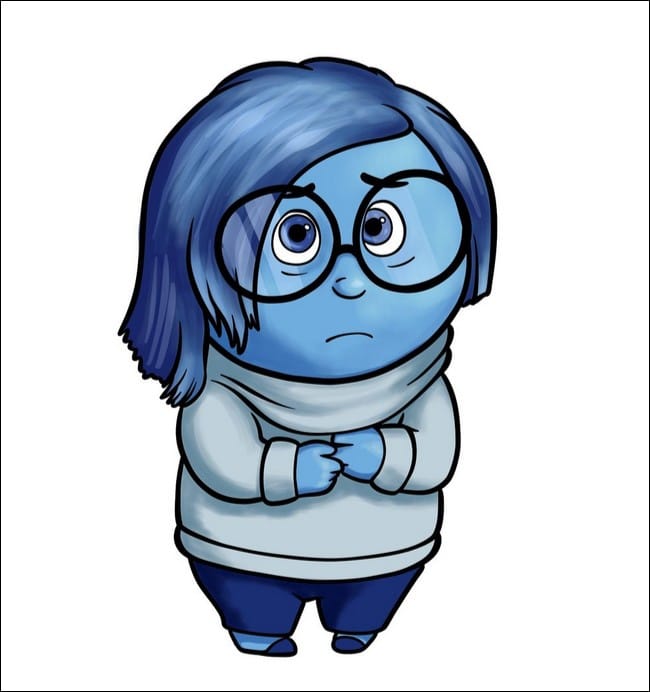The Squishiness of Sadness

Some of us find ourselves with squishy bodies; we have "more to love," so to speak. To get healthier, we often work to slim down, but it can have a negative effect if we reach the point of frailty. According to Dr. Marty Makary, such a state can exacerbate physical decline and lead to unhealthy outcomes. As I get older and watch those I love get older, I'm trying the opposite approach; I want to get squishier. No, I'm not trying to pack on pounds; I am struggling to get more wholeheartedly squishy. I've been emotionally frail far too long.
Six days ago, I read Dr. Kelly Flanagan's latest post "Pain Isn't the Problem, It's the Path." This morning, I find myself grateful for the timing.
Groggily trying to become more conscious as I awake, I noticed the turbulence of cortisol in my stomach. With that awareness, I got curious and tried to remember what I had been pondering. I had been thinking about the granddaughter that I won't get to meet and how overwhelmingly sad my son and daughter-in-law must feel as they process a different future than what they had imagined. I was also thinking about my own dad and how his body is starting to betray him; he is officially feeling "old." Yes, death comes for all of us, but we are rarely ready to face such realities.
Remembering Flanagan's comments about crying every day since Christmas, I was prompted to look for the softer emotion that was driving this anxiety; I found Sadness lingering in the shadows, waiting for an invitation to make herself known. I am still amazed at how naturally I shun or ignore the softer emotions of fear and sadness. While my mind solidly believes everything is fine, my body knows better; it reacts to the nearby emotions by causing my stomach to churn. Learning to listen to my body is hard—but beautiful—work.
Even with this new awareness of the messages my body is relaying to me and the perception of Sadness watching for a cue to engage, it is so hard to allow myself to get to a place where the tears can freely flow. I know I have to do something physical to dispel this cortisol. If I want to keep pushing Sadness away, I could jump on the treadmill and walk for forty-five minutes or do something else to keep myself busy. After all, this has been my go-to response for decades. But I now know I have other options: I could try to stay in this quiet place and get in touch with those feelings; I could let the tears come. So, I seize the tool of imagination. Let's grab the tissues; I'm about to need them.
I try to picture a little girl I won't get to meet until I get to heaven. Does she have her mother's dimples? Does she have her daddy's quick wit? Does she look like her big sister? Is she running around up there playing with dinosaurs—maybe even real ones—because those are one of her sister's current passions? What would her sister's life be like if this little girl had spent more time on Earth? How is my daughter-in-law reacting to the squishiness of pregnancy that promised the reward of a bundle in her arms yet left her with the imprint of tiny feet on a sheet of paper? These musings help me connect with awareness of what has been lost, and the tears flow easier now. Sadness has come out of the shadows.
In addition to feeling a recent loss, I'm becoming aware of what I will lose in the years to come. Not too long ago, my dad's hugs revealed a robust body with a little pot belly. I could feel his squishiness; his muscles were still strong. But now, those hugs feel like the embraces of a skeleton. I know one day I will have to say goodbye to him, and I'm not ready. I'll never be ready. Again imagination encourages me to accept Sadness. I picture myself walking into his house and seeing his empty chair as I say hello to my mother. I will long to hear his greeting of, "What's up, Squirt?" as I bend down to hug Mom. I'll miss hearing his, "Ooh, ooh, ooh," when he finally sees a way to get rid of tiles while playing Rummikub. His laughter and child-like sense of wonder will simultaneously remain with me and create a void. Imagining such a future is hard, but healthy. I've now invited Sadness to come close.
As I let Sadness put her hand lovingly on my shoulder, I embrace the tears. I fall to my knees in prayer, knowing such intimate moments need to be brought to the Healer. The Comforter is there listening to my anguish. Surprisingly, I am reminded of the lyrics to Phil Wickham's song "Falling In Love":
For the stars at night
Every sunset sky
For it all, oh God, I say "I love You"
For the world You made
Every brand new day
For it all, oh God, I say "I love You"
For the cross You bore
Every nail and thorn
For it all, oh God, I say, "I love You"
All I have inside
Heart, soul, and mind
For it all, oh God, I say, "I love You"
I'm caught off guard by this shifting focus, but it makes sense that I would move into a position of worship after baring my soul and leaning into vulnerability. The sense of loss has not gone away, but it is wrapped up lovingly in such a way that it doesn't sting as much. The tsunami has crashed for the moment and the sea is settling back into its normal boundaries.
But I'm not quite done. I need one more thing to help dispel the remaining cortisol: oxytocin. A hug from God was good, but not enough; my husband can provide just what I need. As I work to strengthen my emotional muscles, I am more easily able to find the courage necessary to take this box of tissues to Mark and ask for an embrace. As Riley's memories at the end of the movie Inside Out remind us, Sadness needs to be shared. Mark reacts with empathy and holds me as I tearfully tell him about my morning musings. Knowing he cannot carry the burden for me, he supports me and reminds me that I'm not as frail as I sometimes think I am. There are seasons of life that we don't want to endure, but we can grow stronger because of them. Eventually, my body begins to relax.
Through this experience and others like it, I'm becoming more squishy like Sadness—more marshmallow-y and less frigid. I am indeed finding (and creating) within myself "more to love." Thus continues my journey into wholeheartedness.

Member discussion